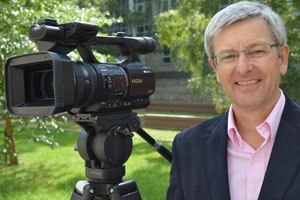 Jonathan Baker is founding professor of journalism at the University of Essex; the new three-year NCTJ-accredited BA degree course launched in October 2015.
Jonathan Baker is founding professor of journalism at the University of Essex; the new three-year NCTJ-accredited BA degree course launched in October 2015.
Before joining the university, Jonathan, left, had a long career as a journalist with BBC News, during which he held a number of senior posts over the whole range of the BBC’s broadcast news activities. Before joining the BBC, he worked as a reporter and sub-editor on the Liverpool Daily Post and Echo.
It sounded, as Robert Peston might say, like a dream job. The opportunity, after more than 40 years in journalism, to distil my knowledge and experience for the benefit of the next generation. And the right to call myself – to the derision or frank disbelief of former colleagues – a professor of journalism.
The opportunity was offered by the University of Essex, which decided early in 2014 to add journalism to its fast-growing portfolio and to look for someone with recent experience at the coalface to devise and run it. Having left the BBC only a few months earlier, and being in need of the axiomatic ‘new challenge’, I didn’t take much persuading to apply.
I began with my eyes at least partly open. I knew I was entering a crowded market of well-established journalism degree courses – although geographically Colchester is a fair distance away from most of them, so we had a good catchment area. And I knew how difficult it was for even the best graduates to find work in a digital maelstrom in which some jobs were evolving at speed while others were disappearing altogether.
It was clear that Essex, in common with other universities, was putting an increased emphasis on graduate employability, and so it was an early, and easy, decision to seek accreditation for the course from the NCTJ. I have spoken to a lot of local media organisations to arrange newsroom visits and work experience for the students, and they have without exception been brilliantly supportive; but so many editors – the people who give aspiring journalists their first jobs – told me that they were not interested in applicants without the NCTJ diploma, and without shorthand.
I was also clear that the course had to be multimedia in character. Today’s graduates are expected to be proficient across print, online, television and radio, and I think we now need to consider social media platforms as a separate, fifth, category. They also need to be many times more technically savvy with more types of kit than any of their forbears.
In all of this, there is always the risk of losing touch with the immutable skills of good story-finding and story-telling which are still the basis for the best journalism, whatever the platform. I decided to concentrate on these in the first year, diversify into different media skills in the second, and in the third to give students the chance to nurture a specialism – for which a big university like Essex offers many opportunities.
This felt like a clean and logical approach. Where my eyes needed to be opened more widely was in the business of shoehorning the content of the course into the administrative structures of the HE world. Even my many years at the BBC left me ill-prepared for the language of modules, credits, learning outcomes, assessment and reassessment, and the sheer volume of information required. The 30-odd documents I found myself obliged to compile in preparation for the university’s internal course validation process ran to more than 200 pages when printed. Having survived that, I went through a version of the process all over again a few months later to satisfy the rigours of NCTJ accreditation.
Thankfully, we negotiated both ordeals successfully and even managed to recruit some students who were willing to join us in our collective leap into the unknown. We have our newsroom, we have our radio and TV kit, we have our TV studios, we’ll soon have our radio studio and – as of this week – we have our students too. They are bright and engaged and their arrival has given us a huge burst of new energy. Already we have high hopes for them, and for the future of journalism at Essex.





 Follow HTFP on Twitter
Follow HTFP on Twitter
It’s a feather in the cap for the university. But in the real world we are going to end up with more professors of journalism than there are jobs for journalists.
Report this comment
Good luck to Jonathan, his course and its students. but you cannot escape the fact that despite all these well-equipped multi media degree courses the pond in which wannabe tv presenters are annually tipped into is drying up fast.
National television has always attracted a certain kind of person from a certain kind of background and via a certain kind of university and will continue to do so. The route for the talented (or sometimes just photogenic) to get either side of a camera from local and regional newspapers is disappearing at an even quicker rate and as for ‘local’ tv being a way in – well look at Mustard TV and the rest: http://www.bbc.co.uk/news/uk-england-norfolk-34505660
I still recall the comment from a lecturer on a university media course (I daren’t say the location but the term ‘dreaming out of town retail park’ might suffice) when I asked where all their students got jobs.
A shrug of the shoulders and ‘I dunno?’ was the reply.
Report this comment